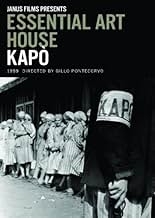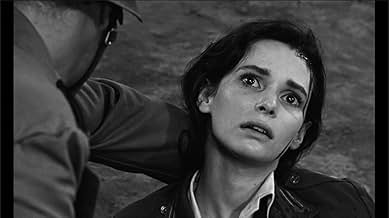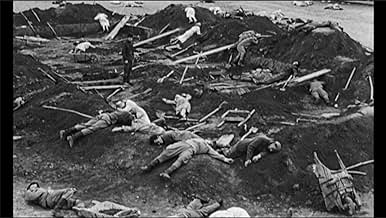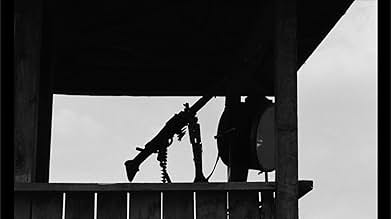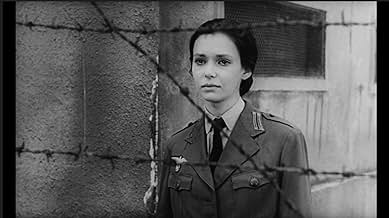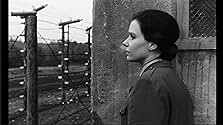AVALIAÇÃO DA IMDb
7,6/10
2,8 mil
SUA AVALIAÇÃO
Adicionar um enredo no seu idiomaA young Jewish girl leads an escape attempt from a concentration camp.A young Jewish girl leads an escape attempt from a concentration camp.A young Jewish girl leads an escape attempt from a concentration camp.
- Direção
- Roteiristas
- Artistas
- Indicado a 1 Oscar
- 3 vitórias e 4 indicações no total
Semka Sokolovic-Bertok
- Une detenuta
- (as Semca Sokolovic)
Dirjana Dojic
- Ninette
- (as Dirjana Dojc)
Graziella Durano
- Une detenuta
- (não creditado)
Sima Janicijevic
- Il medico di Auschwitz
- (não creditado)
Rastislav Jovic
- Yanko Milovich
- (não creditado)
Dusan Perkovic
- Il commandante tedesco
- (não creditado)
Avaliações em destaque
A teen Jewish girl and her family are imprisoned in a concentration camp . There, the 14-years-old girl played by Susan Strasberg finds a harsh reality and changes identities with the help of the camp medic and rises to the position of Kapo. This is a good movie about the brutal existence at concentration camps and subsequent breakout from horrible place. This excellent movie deals about extermination center, abuse of camp guards or Kapos who enjoy their power, prisoners committing suicide and the subsequent getaway led by Laurent Terzieff and Russian prisoners . We see the horrors,murders,massacres against the prisoners and Nazis personify evil . Thus , when the incoming transports ,mostly Jews, SS soldiers made instant decisions,those who were fit to labors were sent into the camp, others including the children ,were dispatched immediately to the gas chambers.Finally the inmates broke out in a desperate riot that I believe it can be the concentration camp of Sorbibor, only in which Russian prisoners achieved to escape . The picture reflects perfectly the atrocities as a by-product of sheer Nazi evil . The flick is powered by splendid performances , as Susan Strasberg, -daughter of Lee Strasberg, creator of Actors studio- as suffering starring and Laurent Terzieff is watchable as obstinate Russian soldier wishing freedom. Appears as secondary actor playing a Nazi soldier Gianni Garco or John Garco, future Spaghetti Western hero named Sartana . Shot in magnificent black and white by Sekulovic and Carlo De Palma , Woody Allen's usual cameraman . Sensitive and atmospheric score by Carlo Rustichelli. The film achieved an Academy Award nominee for Best Foreign movie but lost to the ¨Virgin Spring ¨. This extraordinary and unknown film by one of the pioneers of political film , he always interesting director Gillo Pontecorvo. It was one of the first films about the theme of Jewish holocaust and one of the more realistic in its recreation . Gillo subsequently will directed ¨Battle of Argel¨ and ¨Queimada¨.
The picture is based on real events and survivor's memories,these are the following : The large death camps were transformed into extermination centers to implement the policy of genocide thought at the Wannsee Conference (1942). There was some minor industrial activity linked to the war effort but the main work was the execution of inmates (as happen with the starring's family) . Victims (as Susan Strasberg and her parents) were brought to the camp in unventilated transports, and all but a handful were gassed after arrival,the gas chambers could accommodate hundred prisoners at one time using Zyclon B which was a crystallized prussic acid which dropped into death chamber ,most of their corpses were burned in open pits (as occurs at the ending of the movie when is opened a large hole to bury unfortunates).
The picture is based on real events and survivor's memories,these are the following : The large death camps were transformed into extermination centers to implement the policy of genocide thought at the Wannsee Conference (1942). There was some minor industrial activity linked to the war effort but the main work was the execution of inmates (as happen with the starring's family) . Victims (as Susan Strasberg and her parents) were brought to the camp in unventilated transports, and all but a handful were gassed after arrival,the gas chambers could accommodate hundred prisoners at one time using Zyclon B which was a crystallized prussic acid which dropped into death chamber ,most of their corpses were burned in open pits (as occurs at the ending of the movie when is opened a large hole to bury unfortunates).
This Italian film, following the travails of a young Jewish girl in a Nazi work camp, is successful due mainly to its realistic sets, and the performances of Strasberg and Terzieff. Supporting cast members also shine throughout the film. The whole concept of the "kapo" is new to me, and it added a further dimension to the horrific Nazi experience not covered in films such as "Sophie's Choice" and "The Pianist." Deservedly, it was nominated for an Academy Award (Best Foreign Language Film) in 1960. Strangely enough, most filmographies of Strasberg fail to highlight her incredible performance in this film. Certainly, it must have reflected her performance as Anne Frank on Broadway. The same year as "Kapo," George Stevens released his film version of "Anne Frank," starring Millie Perkins, who took the role once Audrey Hepburn turned it down. Certainly, Strasberg must have been considered.
A "kapo" was a prisoner of a concentration camp that watched over the other prisoners in a specified group. A kapo received better clothing, food, and was not required to work. 2001's "The Grey Zone" would be an appropriate double-feature with this film.
A "kapo" was a prisoner of a concentration camp that watched over the other prisoners in a specified group. A kapo received better clothing, food, and was not required to work. 2001's "The Grey Zone" would be an appropriate double-feature with this film.
This film relates the story of a 14-year-old Jewish girl during her captivity in a Nazi concentration camp. Her role is portrayed by 21 year old Susan Strasberg who had portrayed Anne Frank on stage and Kim Novak's little sister, Millie Owens, in Picnic (1955). Kapò was nominated for an Academy Award for Best Foreign Language Film in 1960, when the Oscar went to Ingmar Bergman's The Virgin Spring.
In 1966, another Gillo Pontecorvo film---The Battle of Algiers--would be nominated in that same category. That year the Oscar went to A Man and a Woman. (I think that the Academy 'missed the boat THAT year!! The idea that The Battle of Algiers could be missed for its greatness is hard to imagine!)
As Kapò begins, Edith (Susan Strasberg), has just finished her harpsichord lesson and is going home when she sees her parents being arrested by the Nazis. When she runs to them, she too, is arrested. The family is transported in a boxcar to a concentration camp in Poland. Once there, the she is separated from her parents and taken to a separate cell block. Anxious to find them, she enters their cell block where we see the film's first terrible images of the over crowed and starving prisoners. While she is unable to find her parents, another female prisoner, Sofia (Didi Perego), sees her there and takes her to a camp doctor for help. Since Edith is new to the camp--and another girl her age had just died the night before--the doctor instructs her how to change her identity and be saved from certain death. As he explains, the prisoners are treated differently based on which patch they have on their smocks: a yellow Star of David indicates that they are Jews; a red patch (such as the doctor's) identifies them as political prisoners; and a black triangle indicates that they are criminals. The doctor tells Edith that she must cut her hair, change her clothes with those of the dead girl and take on a new identity, as Nicole Niepas, a non-Jewish criminal (with a black triangle on her smock).
Camp police (kapòs) are chosen from among the criminal group. They are hated by their fellow prisoners but useful to the SS officers who use them as their eyes and ears within the cell blocks. By being harsh on the other prisoners and reporting any resistance or planned insubordination to their Germans captures, the kapos are given special privileges such as food, clothing, and use of sanitary facilities. But, most importantly, if they do their jobs well, they are not likely to be exterminated with the other prisoners.
Later, Edith sees her parents being marched off to be killed in the gas chamber. With all hope lost, Edith (as Nicole Niepas) becomes a kapo. Her transformation from victim to 'victimizer' increases as she reports the activities of other prisoners and fraternizes with a German soldier in the camp. (She loses her virginity to one of the soldiers in the camp.) Her personal harshness is diminished when Russian POWs are taken to the same concentration camp and she falls in love with the Russian soldier, Sascha (Laurent Terzieff). As the Allies approach the camp near the end of the war in Europe, she agrees to take part in a daring escape plan. But, the as the plan takes shape, we realize that it is not totally without sacrifice..
In 1966, another Gillo Pontecorvo film---The Battle of Algiers--would be nominated in that same category. That year the Oscar went to A Man and a Woman. (I think that the Academy 'missed the boat THAT year!! The idea that The Battle of Algiers could be missed for its greatness is hard to imagine!)
As Kapò begins, Edith (Susan Strasberg), has just finished her harpsichord lesson and is going home when she sees her parents being arrested by the Nazis. When she runs to them, she too, is arrested. The family is transported in a boxcar to a concentration camp in Poland. Once there, the she is separated from her parents and taken to a separate cell block. Anxious to find them, she enters their cell block where we see the film's first terrible images of the over crowed and starving prisoners. While she is unable to find her parents, another female prisoner, Sofia (Didi Perego), sees her there and takes her to a camp doctor for help. Since Edith is new to the camp--and another girl her age had just died the night before--the doctor instructs her how to change her identity and be saved from certain death. As he explains, the prisoners are treated differently based on which patch they have on their smocks: a yellow Star of David indicates that they are Jews; a red patch (such as the doctor's) identifies them as political prisoners; and a black triangle indicates that they are criminals. The doctor tells Edith that she must cut her hair, change her clothes with those of the dead girl and take on a new identity, as Nicole Niepas, a non-Jewish criminal (with a black triangle on her smock).
Camp police (kapòs) are chosen from among the criminal group. They are hated by their fellow prisoners but useful to the SS officers who use them as their eyes and ears within the cell blocks. By being harsh on the other prisoners and reporting any resistance or planned insubordination to their Germans captures, the kapos are given special privileges such as food, clothing, and use of sanitary facilities. But, most importantly, if they do their jobs well, they are not likely to be exterminated with the other prisoners.
Later, Edith sees her parents being marched off to be killed in the gas chamber. With all hope lost, Edith (as Nicole Niepas) becomes a kapo. Her transformation from victim to 'victimizer' increases as she reports the activities of other prisoners and fraternizes with a German soldier in the camp. (She loses her virginity to one of the soldiers in the camp.) Her personal harshness is diminished when Russian POWs are taken to the same concentration camp and she falls in love with the Russian soldier, Sascha (Laurent Terzieff). As the Allies approach the camp near the end of the war in Europe, she agrees to take part in a daring escape plan. But, the as the plan takes shape, we realize that it is not totally without sacrifice..
I was not previously aware of this gem. I found it on TCM after it had already been on for about 10 minutes. I kept thinking that the lead actress looked just like SUSAN STRASBERG & for good reason. It was. The fact that it was foreign with sub-titles threw me initially. Very realistic, almost raw, which was surprising considering that this movie was made in 1959.
STRASBERG as 'Nicole' works her way up through a concentration camp to become the woman in charge of her fellow prisoners. Strong language, violent situations, but this is a story about WWII, not the 'Enchanted Forest'. Good storyline, good direction, & a terrific performance by SUSAN STRASBERG that was all the more admirable when you realize that she was all of 20,21 when she made this.
STRASBERG as 'Nicole' works her way up through a concentration camp to become the woman in charge of her fellow prisoners. Strong language, violent situations, but this is a story about WWII, not the 'Enchanted Forest'. Good storyline, good direction, & a terrific performance by SUSAN STRASBERG that was all the more admirable when you realize that she was all of 20,21 when she made this.
I've never really liked holocaust flicks because they get well, usually made so that the dumbest of the dumb to 'get it.' Kapo is just a movie that shows, not tells, which of course makes the best story. Thanks to TCM for playing this gem that I'll buy on DVD as soon as it comes out. I'd never even heard of it, and I have seen a LOT of flicks.
Susan Strasburg does an incredible job as Nicollete / Edith. Her transformation from shell-shocked victim to cynical survivor is absolutely gripping. The tension in the movie builds to nearly unbearable level and the end simply leaves you scooping your jaw off the floor.
This is the type of movie I sorely needed after going on a loooong dry spell of celluloid garbage. Why this movie isn't famous, I have no idea, but it should be.
Susan Strasburg does an incredible job as Nicollete / Edith. Her transformation from shell-shocked victim to cynical survivor is absolutely gripping. The tension in the movie builds to nearly unbearable level and the end simply leaves you scooping your jaw off the floor.
This is the type of movie I sorely needed after going on a loooong dry spell of celluloid garbage. Why this movie isn't famous, I have no idea, but it should be.
Você sabia?
- CuriosidadesThe producers imposed a romance line in the story and also another ending, different from the one Pontecorvo, the director, wished to shoot.
- Erros de gravaçãoIn the opening scene, Edith walks past some shops on her way back home. One of the shops look like it belongs to the booming 1950s than the more austere WWII period. There is a toy car or baby push car in the store window that shows the typical car design of the 1950s.
- Citações
Edith, alias Nicole Niepas: [to Sasha] Your mother won't like me, I'm not a good girl, and my name's not Nicole, I'm a Jew.
- ConexõesFeatured in Pontecorvo: The Dictatorship of Truth (1992)
Principais escolhas
Faça login para avaliar e ver a lista de recomendações personalizadas
- How long is Kapo?Fornecido pela Alexa
Detalhes
- Tempo de duração
- 1 h 57 min(117 min)
- Cor
- Mixagem de som
- Proporção
- 1.66 : 1
Contribua para esta página
Sugerir uma alteração ou adicionar conteúdo ausente


